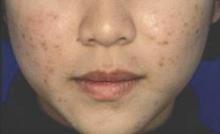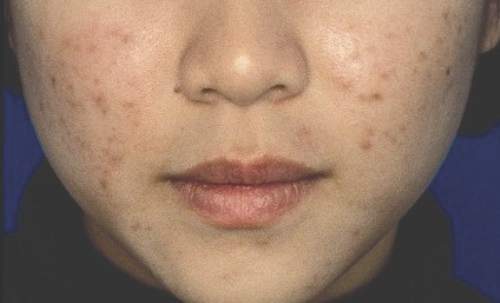User login
MIAMI BEACH – The value of specific instructions for general skin care in acne patients is often underestimated, but clear guidance can improve outcomes, according to Dr. James Q. Del Rosso.
“Skin care is very important. It sounds trivial, but it is extremely important to tell patients exactly what they should be using as far as skin care,” he said at the South Beach Symposium.
Using the wrong products can reduce the efficacy of acne treatment, he said. Patients may use products that damage the stratum corneum and cause excess water loss, thereby increasing the likelihood of irritation. This sets their skin up for additional irritation or sensitization from prescribed topical medications, he explained.
“If you controlled the skin care, you wouldn’t have that problem at all,” said Dr. Del Rosso of Touro University in Henderson, Nev.
Additionally, patients may be engaging in procedures at home, such as microdermabrasion, that can increase transepidermal water loss and promote inflammation as part of the skin’s self-repair mechanism, he noted.
Such inflammation can increase skin sensitivity to medications.
“So controlling the skin care has a lot to do with what the therapeutic outcome will be,” he said.
Dr. Del Russo and colleagues found that a specific regimen consisting of a foam moisturizer and an SPF 30 moisturizer formulated with a lower dose of sunscreen (DermaControl) to reduce the potential for irritation was safe, effective, and well liked by patients when used in conjunction with daily application of a topical gel containing adapalene 1% and benzoyl peroxide 2.5% (Epiduo). Their findings appeared earlier this year (J. Clin. Aesthet. Dermatol. 2015; 8:22-30).
Further, a review of the types of patients included in the original pivotal trials for Epiduo and those in Dr. Del Rosso’s study suggests that use of the DermaControl skin care regimen lessened skin irritation caused by the prescription treatment. The same types of patients were included in both studies, and the same treatment regimen was used, he said.
Additional studies comparing various treatments used with and without specific skin care regimens are needed, and are likely in the future, he said.
Dr. Del Rosso has served as a consultant, researcher, and/or speaker for multiple companies including Allergan, Anacor Pharmaceuticals, Aqua Pharmaceuticals, Bayer HealthCare Pharmaceuticals, Celgene, Dermira, Ferndale Pharmaceuticals, Galderma, Genentech, Innocutis, LEO Pharmaceuticals, Promius Pharma, PuraCap Pharmaceutical, Quinnova Pharmaceuticals, Ranbaxy Pharmaceuticals, Sebacia, Suneva Medical, Taro Pharmaceutical Industries, Unilever, and Valeant. His spouse is employed by Novartis.
MIAMI BEACH – The value of specific instructions for general skin care in acne patients is often underestimated, but clear guidance can improve outcomes, according to Dr. James Q. Del Rosso.
“Skin care is very important. It sounds trivial, but it is extremely important to tell patients exactly what they should be using as far as skin care,” he said at the South Beach Symposium.
Using the wrong products can reduce the efficacy of acne treatment, he said. Patients may use products that damage the stratum corneum and cause excess water loss, thereby increasing the likelihood of irritation. This sets their skin up for additional irritation or sensitization from prescribed topical medications, he explained.
“If you controlled the skin care, you wouldn’t have that problem at all,” said Dr. Del Rosso of Touro University in Henderson, Nev.
Additionally, patients may be engaging in procedures at home, such as microdermabrasion, that can increase transepidermal water loss and promote inflammation as part of the skin’s self-repair mechanism, he noted.
Such inflammation can increase skin sensitivity to medications.
“So controlling the skin care has a lot to do with what the therapeutic outcome will be,” he said.
Dr. Del Russo and colleagues found that a specific regimen consisting of a foam moisturizer and an SPF 30 moisturizer formulated with a lower dose of sunscreen (DermaControl) to reduce the potential for irritation was safe, effective, and well liked by patients when used in conjunction with daily application of a topical gel containing adapalene 1% and benzoyl peroxide 2.5% (Epiduo). Their findings appeared earlier this year (J. Clin. Aesthet. Dermatol. 2015; 8:22-30).
Further, a review of the types of patients included in the original pivotal trials for Epiduo and those in Dr. Del Rosso’s study suggests that use of the DermaControl skin care regimen lessened skin irritation caused by the prescription treatment. The same types of patients were included in both studies, and the same treatment regimen was used, he said.
Additional studies comparing various treatments used with and without specific skin care regimens are needed, and are likely in the future, he said.
Dr. Del Rosso has served as a consultant, researcher, and/or speaker for multiple companies including Allergan, Anacor Pharmaceuticals, Aqua Pharmaceuticals, Bayer HealthCare Pharmaceuticals, Celgene, Dermira, Ferndale Pharmaceuticals, Galderma, Genentech, Innocutis, LEO Pharmaceuticals, Promius Pharma, PuraCap Pharmaceutical, Quinnova Pharmaceuticals, Ranbaxy Pharmaceuticals, Sebacia, Suneva Medical, Taro Pharmaceutical Industries, Unilever, and Valeant. His spouse is employed by Novartis.
MIAMI BEACH – The value of specific instructions for general skin care in acne patients is often underestimated, but clear guidance can improve outcomes, according to Dr. James Q. Del Rosso.
“Skin care is very important. It sounds trivial, but it is extremely important to tell patients exactly what they should be using as far as skin care,” he said at the South Beach Symposium.
Using the wrong products can reduce the efficacy of acne treatment, he said. Patients may use products that damage the stratum corneum and cause excess water loss, thereby increasing the likelihood of irritation. This sets their skin up for additional irritation or sensitization from prescribed topical medications, he explained.
“If you controlled the skin care, you wouldn’t have that problem at all,” said Dr. Del Rosso of Touro University in Henderson, Nev.
Additionally, patients may be engaging in procedures at home, such as microdermabrasion, that can increase transepidermal water loss and promote inflammation as part of the skin’s self-repair mechanism, he noted.
Such inflammation can increase skin sensitivity to medications.
“So controlling the skin care has a lot to do with what the therapeutic outcome will be,” he said.
Dr. Del Russo and colleagues found that a specific regimen consisting of a foam moisturizer and an SPF 30 moisturizer formulated with a lower dose of sunscreen (DermaControl) to reduce the potential for irritation was safe, effective, and well liked by patients when used in conjunction with daily application of a topical gel containing adapalene 1% and benzoyl peroxide 2.5% (Epiduo). Their findings appeared earlier this year (J. Clin. Aesthet. Dermatol. 2015; 8:22-30).
Further, a review of the types of patients included in the original pivotal trials for Epiduo and those in Dr. Del Rosso’s study suggests that use of the DermaControl skin care regimen lessened skin irritation caused by the prescription treatment. The same types of patients were included in both studies, and the same treatment regimen was used, he said.
Additional studies comparing various treatments used with and without specific skin care regimens are needed, and are likely in the future, he said.
Dr. Del Rosso has served as a consultant, researcher, and/or speaker for multiple companies including Allergan, Anacor Pharmaceuticals, Aqua Pharmaceuticals, Bayer HealthCare Pharmaceuticals, Celgene, Dermira, Ferndale Pharmaceuticals, Galderma, Genentech, Innocutis, LEO Pharmaceuticals, Promius Pharma, PuraCap Pharmaceutical, Quinnova Pharmaceuticals, Ranbaxy Pharmaceuticals, Sebacia, Suneva Medical, Taro Pharmaceutical Industries, Unilever, and Valeant. His spouse is employed by Novartis.
AT THE SOUTH BEACH SYMPOSIUM

